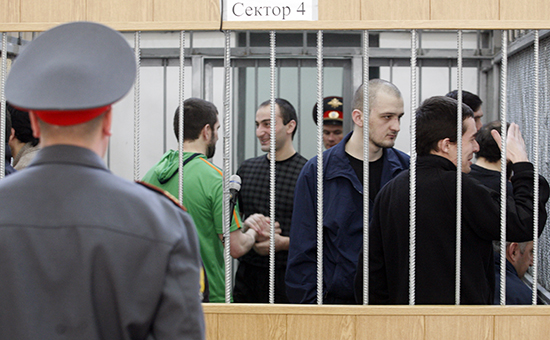
Rift Between Supporters of Caucasus Emirate and IS Deepens in North Caucasus
Publication: Eurasia Daily Monitor Volume: 12 Issue: 10
By:

The most talked about subject in Kabardino-Balkaria so far in 2015 is the prison sentences passed handed down to the militants who participated in the insurrection in the republican capital in 2005. On October 13 of that year, groups of militants under the command of Shamil Basaev organized an all out attack on Nalchik, engaging in street fighting and attempting to take over all government offices (Izvestia, October 17, 2005). In the ensuing fighting, 35 servicemen and 15 civilians were killed, while 129 servicemen and 66 civilians were injured (Top.rbc.ru, December 23, 2014). The real losses among the rebels are hard to assess, since the authorities included in the casualty numbers everyone killed that day, including those killed accidentally in the crossfire. According to the government, 92 terrorists were killed and 13 detained, while another 24 suspected attackers were put on the wanted list (Newsru.com, June 5, 2006).
The trial, which lasted for seven years, was the largest judicial process in contemporary Russian history in terms of the number of defendants. On December 23, 2014, the court announced sentences for 57 suspects who remained in police custody. Five of them—Anzor Mashukov, Murat Bapinaev, Aslan Kuchmenov, Rasul Kudaev and Eduard Mironov—were sentenced to life in prison (Top.rbc.ru, December 23, 2014). Thirteen suspects received various prison sentences earlier while 14 remain at large. On December 23, 52 suspects received prison sentences ranging from 4 years to 23 years (Sledcom.ru, December 23, 2014).
The objectivity of the convictions in the case can be assessed based on the case of one of the people sentenced to life, Rasul Kudaev. According to many of Kudaev’s co-villagers, on the day of the attack on Nalchik, he was in his village, yet the court still designated him as one of the organizers of the uprising. His earlier detention in Guantanamo was probably the primary reason for the latest court conviction (Kavkazsky Uzel, December 26, 2014). Based on that, Memorial human rights center proclaimed him a political prisoner (Memo.ru, January 16, 2014). The court’s biases were also illuminated in the case: the judge claimed Aslan Maskhadov, the former democratically elected president of Ichkeria, was involved in organizing the attack, even though he had been dead by then for eight months (Kommersant, March 9, 2005).
While suffering significant losses in the 2005 attack, the jamaat of Kabardino-Balkaria did not become weaker: on the contrary, during the period from 2007 to 2012, it was one of the most active jamaats in the North Caucasus. One of the organizers of the attack on Nalchik, Anzor Astemirov, became a kind spiritual founder of the Caucasus Emirate.
Despite having suffered serious losses, the jamaat of Kabardino-Balkaria and Karachay (KBK) remains one of the important parts of the armed resistance in the North Caucasus. Therefore, the conviction of 57 militants is unlikely to remain without consequences, as those angered by the sentences will likely join the ranks of the rebel groups in order to retaliate against the authorities.
Incomplete data for 2014 shows that there were two terrorist attacks and 22 armed clashes in Kabardino-Balkaria, and that 59 people were victims of fighting, 42 of whom were killed and 17 wounded. These casualties included two civilians, one of whom was wounded and one killed; 19 of the casualties were servicemen, four of whom were killed and 15 wounded. Thirty-eight suspected rebels were also among the casualties, 37 of whom were killed and one wounded (Kavkazsky Uzel, December 4, 2014).
Meanwhile, the leader of the KBK, Emir Salim (Zalim Shebzukhov), announced who he will side with in the deepening dispute between the Caucasus Emirate and the Islamic State (IS). Emir Salim confirmed his oath of allegiance to the leader of the Caucasus Emirate, Sheikh Abu Muhammad (Aliaskhab Kebekov) (Islamdin.com, January 1, 2015). Emir Salim is not a novice among the rebels, even though he was officially put on the wanted list only in March 2014 (07.mvd.ru, March 19, 2014), when he was still the emir of the Central Sector of the Velayat KBK. The 28-year-old KBK emir expressed regret that some of the emirs of the Caucasus Emirate had pledged allegiance to IS leader Abu Bakr al-Baghdadi, saying this would only weaken the movement in the North Caucasus. From his speech it can be concluded that prior to deciding who he would back, he had also consulted Islamic scholars who were united in rejecting Abu Bakr al-Baghdadi’s claim about being caliph. According to Emir Salim the situation in Russia will favor the Caucasus Emirate’s endeavors since the country is doomed to fall apart. At the end of his speech, the leader of the insurgents of Kabardino-Balkaria and Karachaevo-Cherkessia called on those militants who took an oath of allegiance to Abu Bakr al-Baghdadi to return under the command of the emir of the Caucasus Emirate, Sheikh Abu Muhammad.
Emir Salim’s support is extremely important for the leader of the Caucasus Emirate, which is rapidly falling apart. If the emirs of Chechnya and Ingushetia both support Emir Abu Muhammad, the disintegration of the Caucasus Emirate may be halted, although it is unlikely that the situation can be changed significantly in the Caucasus Emirate’s favor.
The union of Emir Salim with Emir Abu Muhammad is the preferred outcome for Moscow. While the Caucasus Emirate is a regional organization, the Islamic State may potentially involve the North Caucasus in the events in Syria and Iraq, making the region part of the larger Middle Eastern problem. This means that Russian authorities might unofficially side with the Caucasus Emirate against their common enemy, the Islamic State.




